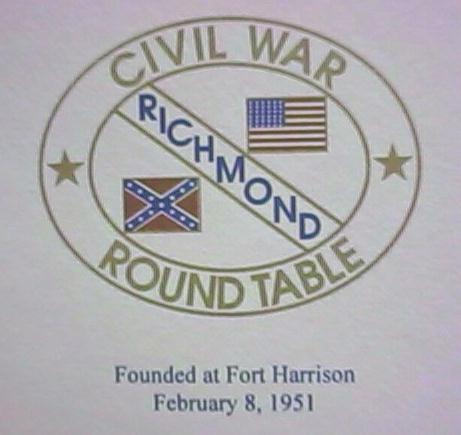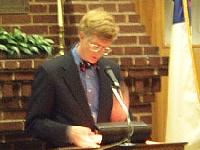


February 2003
rcwrt.org
Brag Bowling, President Art Bergeron, Editor 3019 Kensington Ave 3901 Paces Ferry Road Richmond, VA 23221 Chester, VA 23831-1239
February 2003 PROGRAM Dr. Mark A. Snell "General William Buel Franklin" 8:00 p.m., Tuesday, February 11, 2003, at the Boulevard United Methodist Church, 321 N. Boulevard, Richmond, VA (corner of Boulevard and Stuart Ave.) Enter the basement door on the right side under the front steps. Dr. Mark A. Snell is the director of the George Tyler Moore Center for the Study of the Civil War at Shepherd College in Shepherdstown, West Virginia. He earned his Ph.D. from the University of Missouri-Kansas City. Snell is a retired army officer and served as an assistant professor at the United States Military Academy, West Point, New York. At Shepherd College, he chairs the Civil War and 19th Century America program and teaches two Civil War courses, an American history survey course, and a course on World War I. His most recent book is From First to Last: The Life of Major General William B. Franklin (Fordham, 2002). The number one graduate of the West Point class of 1843, William Buel Franklin served in the U.S. Army's Corps of Topographical Engineers and contributed greatly to the building of the nation's internal improvements, including a stint as chief engineer in charge of construction of the U.S. Capitol's dome and extension. During the Civil War, Franklin ascended rapidly in rank and command authority, from command of a Union brigade at Bull Run, to leadership of the Sixth Corps of the Army of the Potomac on the Peninsula and during the Maryland Campaign, to command of the Left Grand Division at the Battle of Fredericksburg. In the wake of Fredericksburg, Franklin was blamed for the Union army's defeat. Censured by the Joint Congressional Committee on the Conduct of the War, Franklin was banished to the Department of the Gulf, where he participated in the ill-fated Sabine Pass Expedition and Red River Campaign. After these disasters, Franklin could not escape the wrath of the Lincoln administration, which refused to place him back in command even though his old West Point classmate-U. S. Grant-personally requested his services.
Review of the January Program
 |
Announcements
Newsletter Editor Needed The Round Table is looking for a person(s) to take over the monthly newsletter from Carol and Art Bergeron. This transition needs to take place no later than mid-March so that the new editor(s) can put out the April issue. Carol and Art will try to make the transition as easy as possible by explaining how they have handled the newsletter over the past two years and passing along to the new editor(s) all appropriate computer files (old newsletters and the current mailing list). A quality publication remains the Round Table's goal. If you are willing to take on this important task, please call Art at 861-2408 during the day or 717-2281 during the evening.
"Gods and Generals" Premiere The Round Table is one of the sponsors of a premiere of the movie "Gods and Generals," which will be held at the Carpenter Center at 7:30 p.m., Tuesday, February 18. Proceeds from the event will benefit our club as well as the other sponsoring organizations. Tickets are available starting at $100 per person. For information and tickets, call (804) 344-8081.
Brandy Station Tour Clark B. Hall will lead a special tour of the little-visited sites at the Brandy Station battlefield on March 15. The tour will cover the back reaches of the site as well as "hidden" and difficult fords. There will be lots of walking, and participants will often have to negotiate muddy areas. The cost is $15 per person, and checks should be made out to the Brandy Station Foundation. Send your checks to Sam Craghead, 4361F Lakefield Mews, Richmond, VA 23231. Participants will be traveling by car from Richmond, so if you are willing to be a driver please let Sam know. The group will leave Richmond early enough to arrive in the Brandy Station area about 8 a.m.
University of Richmond Class The University of Richmond School of Continuing Studies announces a course titled "Civil War in Virginia: Lee Triumphant." After turning back a Union assault upon Richmond in July 1862, General Robert E. Lee led his Army of Northern Virginia through a series of battles during the next year without suffering defeat. The non-credit course explores Lee's generalship and the impact of the Civil War upon Virginians, their allies and their adversaries. A variety of materials will be supplied by the instructor, Jack Mountcastle. The class will run for four weeks in March, meeting on Monday nights from 7:00-9:00 p.m. and will take a Saturday field trip to Fredericksburg and Chancellorsville in early April. The fee is $109. For more info, call the School of Continuing Studies at 804-289-8133, or visit the University of Richmond website at www.richmond.edu. Choose "Continuing Studies" then look at "Non-credit Courses" for info contained in the "Think Again" catalog for Winter 2003.
Lincoln Symposium The Virginia Division of the Sons of Confederate Veterans is pleased to announce that on March 22, there will be a major educational seminar to be held in Richmond, Virginia. The Foundation for American Education and Rockwell.com will jointly sponsor an educational symposium on Abraham Lincoln which will critically analyze the 16th President and his place in American history. The Symposium will be held at the John Marshall Hotel in downtown Richmond beginning at 9 a.m. on March 22 and lasting until 4:30 p.m. Hotel information will be forthcoming. The following scholars are scheduled to participate: Professor Thomas DiLorenzo, Loyola University of Maryland - "The Politics and Economics of Reconstruction" Dr. Thomas Fleming, Chronicles Editor - "Lincoln and Racism" Dr. Scott Trask, Research Fellow, Mises Institute, Auburn University - "Northern Opposition to Lincoln" Dr. Donald Livingstone, Emory University - "Lincoln and Slavery" Dr. Joe Stromberg, Rothland Research Fellow, Mises Institute, Auburn University - "Lincoln and Total War" John Chodes, New York City Playwright - Northern Opposition to Lincoln"
RCWRT Monthly Speakers for 2003
Newsletter Deadlines To facilitate the printing and timely distribution of the monthly newsletter, information for it should be submitted to the editors no later than the following dates: For the March newsletter, no later than February 21 For the April newsletter, nolater than March 21 For the May newsletter, nolater than April 25 For the June newsletter, nolater than May 23 For the July newsletter, nolater than June 20 For the August newsletter, nolater than July 25 For the September newsletter, nolater than August 22 For the October newsletter, nolater than September 26 For the November newsletter, nolater than October 24 For the December newsletter, nolater than November 21
Richmond Civil War Round Table Newsletter Art & Carol Bergeron, Editors 3901 Paces Ferry Road Chester, VA 23831-1239
Return to News Letters Index
Return to main page

©R.C.W.R.T. 2003